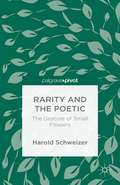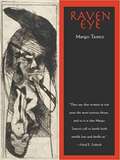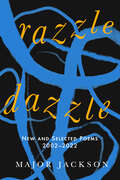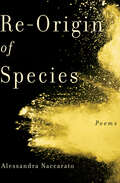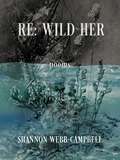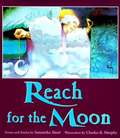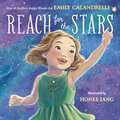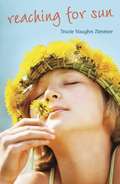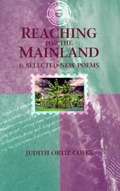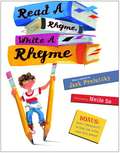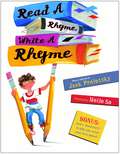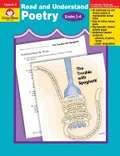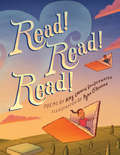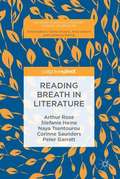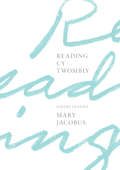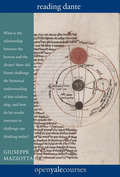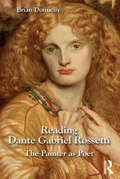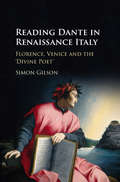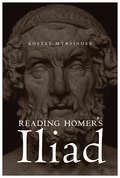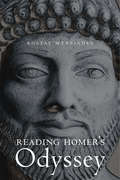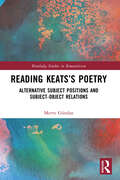- Table View
- List View
Rarity and the Poetic: The Gesture of Small Flowers
by Harold SchweizerRarity is a quality by which things flowers, leaves, light, sound fleetingly appear and disappear, leaving in their wake a resonance of something we just thought we had glimpsed. Each of the nine chapters in this book pursues such intimations of rarity in poetic ideas, images, and silences.
Rashmi
by Mahadevi VermaRashmi is a collection of new and old poems of Mahadevi Verma. The collection as a regular feature incorporates the feature of chayavaad. A great source of learning for students of Hindi literature.
Raven Eye (Sun Tracks #60)
by Margo TamezWritten from thirteen years of journals, psychic and earthly, this poetry maps an uprising of a borderland indigenous woman battling forces of racism and sexual violence against Native women and children. This lyric collection breaks new ground, skillfully revealing an unseen narrative of resistance on the Mexico–U.S. border. A powerful blend of the oral and long poem, and speaking into the realm of global movements, these poems explore environmental injustice, sexualized violence, and indigenous women’s lives. <p><p> These complex and necessary themes are at the heart of award-winning poet Margo Tamez’s second book of poetry. Her poems bring forth experiences of a raced and gendered life along the border. Tamez engages the experiences of an indigenous life, refusing labels of Mexican or Native American as social constructs of a colonized people. This book is a challenging cartography of colonialism, poverty, and issues of Native identity and demonstrates these as threats to the environment, both ecological and social, in the borderlands. Each poem is crafted as if it were a minute prayer, dense with compassion and unerring optimism. <p><p> But the hope that Tamez serves is not blind. In poem after poem, she draws us into a space ruled by mythic symbolism and the ebb and flow of the landscape—a place where comfort is compromised and where we must work to relearn the nature of existence and the value of life.
Razzle Dazzle: New and Selected Poems 2002-2022
by Major JacksonOne of Literary Hub's Most Anticipated Books of 2023 An exuberant collection of two decades of Major Jackson’s passionately intelligent poetry. A preeminent voice in contemporary literature, Major Jackson offers steady miracles of vision and celebrations of language in rapturous, sophisticated poems. Razzle Dazzle traces the evolution of Jackson’s transformative imagination and fierce music through five acclaimed volumes: his Cave Canem Poetry Prize–winning debut, Leaving Saturn (2002), which captures the spirit of resilience in the Philadelphia neighborhoods of the poet’s youth; Hoops (2006), which finds transcendence in the solemn marvels of ordinary lives; Holding Company (2010), which shifts away from narrative to explore the seductive force of art, literature, and music; Roll Deep (2015), which addresses human intimacy, war, and the spirit of aesthetic travel; and his vulnerable, philosophical latest, The Absurd Man (2020). The volume opens with over three dozen new poems that erupt into full-throated song in the face of indignity and invite us into a passionate experience of the world. Taken together, these two decades of writing offer a sustained portrait of a poet “bound up in the ecstatic,” whose buoyant lyricism confronts the social and political forces that would demean humanity. Equally attuned to sensuous connection, metaphysical inquiries, the natural world, and ever-changing urban landscapes, Jackson possesses a sensibility at once global and personal, driven by an enduring conviction in the possibilities of art and language to mark our lives with meaning. Whether addressing racial conflict and the ongoing struggle for human dignity in America, bearing witness to the plight of refugees, or grieving the contradictory nature of humankind, these dexterous poems proclaim the remarkable power of renewal, justice, and accountability.
Re-Origin of Species
by Alessandra NaccaratoWinner of RBC Bronwen Wallace Award for Emerging WritersWinner of CBC Poetry PrizeFrom hybrid bodies to shifting landscapes, Re-Origin of Species blurs the lines of the real. These poems journey through illness and altered states to position disability and madness as evolutionary traits; skilled adaptations aligned with ecological change.A lyric contemplation of our relationship to the environment, this book looks at the interdependence of species. Weaving personal narratives with a study of the insect kingdom, it draws parallels between human illness, climate change, and the state of peril in the natural world.
Re-Origin of Species
by Alessandra NaccaratoWinner of RBC Bronwen Wallace Award for Emerging WritersWinner of CBC Poetry PrizeShortlisted for the 2020 Gerald Lampert Memorial AwardLonglisted for the 2020 Pat Lowther Memorial AwardFrom hybrid bodies to shifting landscapes, Re-Origin of Species blurs the lines of the real. These poems journey through illness and altered states to position disability and madness as evolutionary traits; skilled adaptations aligned with ecological change.A lyric contemplation of our relationship to the environment, this book looks at the interdependence of species. Weaving personal narratives with a study of the insect kingdom, it draws parallels between human illness, climate change, and the state of peril in the natural world.Praise for Re-Origin of Species:"In this debut collection of startling beauty, Alessandra Naccarato weaves together the mythological and mundane, the ephemeral and the eternal, into a luminous tapestry of lyric and narrative. Naccarato's shimmering threads illuminate the connections that bind together every living thing on every level of being—from the interpersonal, to the political, to the spiritual. This is exquisite, playful, intentional poetry—and it just might be medicine for us all." —Kai Cheng Thom, author of I HOPE WE CHOOSE LOVE: A Trans Girl's Notes From the End of the World"What a hive of a book—these poems are so urgent, gorgeous, and necessary. Re-Origin of Species is a siren's call and warning siren all at once." —Leah Horlick, author of For Your Own Good"Ranging from the sting of personal loss to navigating landscapes full of promise, Naccarato?s poetry interrogates the place where the personal meets the wild." —2015 RBC Bronwen Wallace Award Jury
Re: Wild Her
by Shannon Webb-CampbellIn nature, rewilding restores biodiversity and ecosystems. In this new collection from award-winning poet Shannon Webb-Campbell, it is a form of Indigenous resurgence and pleasure.Drawing upon ecology, traditional knowledge, and sexuality, Re: Wild Her is a personal and poetic awakening. In these pages artistry and nature are intertwined, speaking to the sensual musings of lovers in Paris, driftwood and death cycles, and the rise of wild swimming and cold dipping. Throughout, reclaiming one’s divine femininity is celebrated as a powerful act of resistance and rejuvenation. These “poem spells” each offer a different prism with which to rewild ourselves, answering the call: How does joy help us cope with the harsh realities and complexities of life? How does poetry help us move forward? Re: Wild Her is an invitation to catapult into the otherworldly, to dive with the muses, and to resubmerge ourselves in joy.
Reach for the Moon
by Samantha AbeelPoetry, written by a girl with learning disabilities, reflects her feelings and experiences.
Reach for the Stars
by Emily CalandrelliFrom Emmy-nominated science TV star and host of Netflix’s hit series Emily’s Wonder Lab Emily Calandrelli comes an inspirational message of love and positivity.From the moment we are born, we reach out. We reach out for our loved ones, for new knowledge and experiences, and for our dreams!Whether celebrating life’s joyous milestones, sharing words of encouragement, or observing the wonder of the world around us, this uplifting book will inspire readers of every age. A celebration of love and shared discovery, this book will encourage readers to reach for the stars!
Reaching for Sun
by Tracie Vaughn ZimmerJosie Wyatt knows what it means to be different. Her family's small farmhouse seems to shrink each time another mansion grows up behind it. She lives with her career-obsessed mom and opinionated Gran, but has never known her father. Then there's her cerebral palsy: even if Josie wants to forget that she was born with a disability, her mom can't seem to let it go. Yet when a strange new boy--Jordan--moves into one of the houses nearby, he seems oblivious to all the things that make Josie different. Before long, Josie finds herself reaching out for something she's never really known: a friend... and possibly more. Interlinked free verse poems tell the beautiful, heartfelt story of a girl, a family farm reduced to a garden, and a year of unforgettable growth.<P><P> Winner of the Schneider Family Book Award
Reaching for the Mainland and Selected New Poems
by Judith Ortiz CoferThis work includes a selection of new poems as well as the original poems from Reaching for the Mainland, a body of poems that appeared in the collection Triple Crown.
Read a Rhyme, Write a Rhyme
by Jack PrelutskyFrom the book: Here, with poems on ten themes, such as birthdays and bugs, food and friends, is something new and delightfully different-- poem starts. Jack provides the opening lines, gives several suggestions of what you might think about--even some rhyming words to play with--then invites you to grab some paper and a pencil and finish the poem as you please. Maybe you didn't know it, but you too can be a poet! Includes picture descriptions.
Read a Rhyme, Write a Rhyme
by Jack Prelutsky Meilo SoWhen Jack Prelutksy posted the first couplet of a funny poem on a Web site and invited children to finish it, he expected about 100 responses. He got thousands. Now he has come up with an anthology of poems on 10 popular subjects by well-known poets and combined it with his own “poemstarts.” Included with each poemstart are suggestions for various ways the reader might continue the poem. With large type and a big red stop sign, it is made abundantly clear that the reader get a pencil and paper to complete the poem. Jack Prelutsky has been credited with making poetry fun for children to read. Now he is making poetry fun for children to write!
Read and Understand Poetry, Grades 3-4
by The Editors at the Evan-MoorEvan-Moor's Read and Understand Poetry series has been developed to provide students and their teachers with a structured approach for working with poetry.
Read! Read! Read!: Journey To The West (Penguin Active Reading (graded Readers) Series)
by Amy Ludwig VanDerwaterCapture the joys of reading in this amazing poetry collection! From that thrilling moment when a child first learns to decipher words, to the excitement that follows in reading everything from road signs to field guides to internet articles to stories, these poems celebrate reading. They also explore what reading does -- how it opens minds, can make you kind, and allows you to explore the whole world. Ryan O&’Rourke&’s rich artwork beautifully captures the imagination and playfulness in these poems by noted author Amy Ludwig VanDerwater.
Reading Breath in Literature (Palgrave Studies in Literature, Science and Medicine)
by Peter Garratt Arthur Rose Stefanie Heine Naya Tsentourou Corinne SaundersThis open access book presents five different approaches to reading breath in literature, in response to texts from a range of historical, geographical and cultural environments. Breath, for all its ubiquity in literary texts, has received little attention as a transhistorical literary device. Drawing together scholars of Medieval Romance, Early Modern Drama, Fin de Siècle Aesthetics, American Poetics and the Postcolonial Novel, this book offers the first transhistorical study of breath in literature. At the same time, it shows how the study of breath in literature can contribute to recent developments in the Medical Humanities.
Reading Cy Twombly: Poetry in Paint
by Mary JacobusMany of Cy Twombly's paintings and drawings include handwritten words and phrases--naming or quoting poets ranging from Sappho, Homer, and Virgil to Mallarmé, Rilke, and Cavafy. Enigmatic and sometimes hard to decipher, these inscriptions are a distinctive feature of his work. Reading Cy Twombly poses both literary and art historical questions. How does poetic reference in largely abstract works affect their interpretation?Reading Cy Twombly is the first book to focus specifically on the artist's use of poetry. Twombly's library formed an extension of his studio and he sometimes painted with a book open in front of him. Drawing on original research in an archive that includes his paint-stained and annotated books, Mary Jacobus's account--richly illustrated with more than 125 color and black-and-white images--unlocks an important aspect of Twombly's practice.Jacobus shows that poetry was an indispensable source of reference throughout Twombly's career; as he said, he "never really separated painting and literature." Among much else, she explores the influence of Ezra Pound and Charles Olson; Twombly's fondness for Greek pastoral poetry and Virgil's Eclogues; the inspiration of the Iliad and Ovid's Metamorphoses; and Twombly's love of Keats and his collaboration with Octavio Paz.Twombly's art reveals both his distinctive relationship to poetry and his use of quotation to solve formal problems. A modern painter, he belongs in a critical tradition that goes back, by way of Roland Barthes, to Baudelaire. Reading Cy Twombly opens up fascinating new readings of some of the most important paintings and drawings of the twentieth century.
Reading Dante
by Giuseppe MazzottaA towering figure in world literature, Dante wrote his great epic poem Commedia in the early fourteenth century. The work gained universal acclaim and came to be known as La Divina Commedia, or The Divine Comedy. Giuseppe Mazzotta brings Dante and his masterpiece to life in this exploration of the man, his cultural milieu, and his endlessly fascinating works. Based on Mazzotta’s highly popular Yale course, this book offers a critical reading of The Divine Comedy and selected other works by Dante. Through an analysis of Dante’s autobiographical Vita nuova, Mazzotta establishes the poetic and political circumstances of The Divine Comedy. He situates the three sections of the poem--Inferno, Purgatory, Paradise--within the intellectual and social context of the late Middle Ages, and he explores the political, philosophical, and theological topics with which Dante was particularly concerned.
Reading Dante Gabriel Rossetti: The Painter as Poet
by Brian DonnellyA revolutionary figure throughout his career, Dante Gabriel Rossetti’s work provides a distinctly revolutionary lens through which the Victorian period can be viewed. Suggesting that Rossetti’s work should be approached through his poetry, Brian Donnelly argues that it is both inscribed by and inscribes the development of verbal as well as visual culture in the Victorian era. In his discussions of modernity, aestheticism, and material culture, he identifies Rossetti as a central figure who helped define the terms through which we approach the cultural productions of this period. Donnelly begins by articulating a method for reading Rossetti’s poetry that highlights the intertextual relations within and between the poetry and paintings. His interpretations of such poems as the 'Mary’s Girlhood' sonnets, the sonnet sequence The House of Life, and 'The Orchard-Pit' in relationship to paintings such as The Girlhood of Mary Virgin and Ecce Ancilla Domini! shed light on Victorian ideals of femininity, on consumer culture, and on the role of gender hierarchies in Victorian culture. Situating Rossetti’s poetry as the key to all of his work, Donnelly also makes a case for its centrality in its representation of the dominant discourses of the late Victorian period: faith, sex, consumption, death, and the nature of representation itself.
Reading Dante in Renaissance Italy: Florence, Venice and the 'Divine Poet'
by Simon GilsonSimon Gilson's new volume provides the first in-depth account of the critical and editorial reception in Renaissance Italy, particularly Florence, Venice and Padua, of the work of Dante Alighieri (1265-1321). Gilson investigates a range of textual frameworks and related contexts that influenced the way in which Dante's work was produced and circulated, from editing and translation to commentaries, criticism and public lectures. In so doing he modifies the received notion that Dante and his work were eclipsed during the Renaissance. Central themes of investigation include the contestation of Dante's authority as a 'classic' writer and the various forms of attack and defence employed by his detractors and partisans. The book pays close attention not only to the Divine Comedy but also to the Convivio and other of Dante's writings, and explores the ways in which the reception of these works was affected by contemporary developments in philology, literary theory, philosophy, theology, science and printing.
Reading Homer's Iliad
by Kostas MyrsiadesWe still read Homer’s epic the Iliad two-and-one-half millennia since its emergence for the questions it poses and the answers it provides for our age, as viable today as they were in Homer’s own times. What is worth dying for? What is the meaning of honor and fame? What are the consequences of intense emotion and violence? What does recognition of one’s mortality teach? We also turn to Homer’s Iliad in the twenty-first century for the poet’s preoccupation with the essence of human life. His emphasis on human understanding of mortality, his celebration of the human mind, and his focus on human striving after consciousness and identity has led audiences to this epic generation after generation. This study is a book-by-book commentary on the epic’s 24 parts, meant to inform students new to the work. Endnotes clarify and elaborate on myths that Homer leaves unfinished, explain terms and phrases, and provide background information. The volume concludes with a general bibliography of work on the Iliad, in addition to bibliographies accompanying each book’s commentary.
Reading Homer’s Odyssey
by Kostas MyrsiadesHomer’s Odyssey is the first great travel narrative in Western culture. A compelling tale about the consequences of war, and about redemption, transformation, and the search for home, the Odyssey continues to be studied in universities and schools, and to be read and referred to by ordinary readers. Reading Homer’s Odyssey offers a book-by-book commentary on the epic’s themes that informs the non-specialist and engages the seasoned reader in new perspectives. Among the themes discussed are hospitality, survival, wealth, reputation and immortality, the Olympian gods, self-reliance and community, civility, behavior, etiquette and technology, ease, inactivity and stagnation, Penelope’s relationship with Odysseus, Telemachus’ journey, Odysseus’ rejection of Calypso’s offer of immortality, Odysseus’ lies, Homer’s use of the House of Atreus and other myths, the cinematic qualities of the epic’s structure, women’s role in the epic, and the Odyssey’s true ending. Footnotes clarify and elaborate upon myths that Homer leaves unfinished, explain terms and phrases, and provide background information. The volume concludes with a general bibliography of work on the Odyssey, in addition to the bibliographies that accompany each book’s commentary. Published by Bucknell University Press. Distributed worldwide by Rutgers University Press.
Reading John Keats
by Susan J. WolfsonJohn Keats (1795–1821), one of the best-loved poets of the Romantic period, is ever alive to words, discovering his purposes as he reads - not only books but also the world around him. Leading Keats scholar Susan J. Wolfson explores the breadth of his works, including his longest ever poem Endymion; subsequent romances, Isabella (a Boccaccio tale with a proto-Marxian edge admired by George Bernard Shaw), the passionate Eve of St Agnes and knotty Lamia; intricate sonnets and innovative odes; the unfinished Hyperion project (Keats's existential rethinking of epic agony); and late lyrics involved with Fanny Brawne, the bright (sometimes dark) star of his last years. Illustrated with manuscript pages, title-pages, and two portraits, Reading John Keats investigates the brilliant complexities of Keats's imagination and his genius in wordplay, uncovering surprises and new delights, and encouraging renewed respect for the power of Keats's thinking and the subtle turns of his writing.
Reading Keats’s Poetry: Alternative Subject Positions and Subject-Object Relations (Routledge Studies in Romanticism)
by Merve GündayThis book claims that Keats’s poetry is a reaction against the discourse of modernity which traumatized the human subject by creating a divide between human and nature, subject and object. It argues that by transcending this divide and acknowledging the agency of both subject and object, Keats makes an ideological statement and offers a new site of existence or relationality to readers. This site also implies a response to the accusations that the Romantics were not interested in the realities of their time. What Keats does is to give an aestheticized response to the hardcore facts of his time. Departing from previous studies due to its emphasis on subjectivity and relationality, the book discusses Keats with regard to post/non-anthropocentric, alternative subject positions and subject-object relations in his “Ode to a Nightingale,” “In drear nighted December,” “Isabella; or, The Pot of Basil,” “Lamia,” “La Belle Dame sans Mercy,” and “Ode on a Grecian Urn.” Drawing on Lacanian and Braidottian epistemologies in its discussion of the intricacy between the imaginary and the symbolic, the irruption of the psychotic into the symbolic, and the agency of the object on the subject in Keats’s poetry, the book suggests that the inner dynamics of both the subject and the object acquire agency, which shatters Oneness and totality assumed in the Cartesian self.
Reading Literature: Fiction, Poetry, and Exercises Based on Common Core State Standards
by Prestwick HouseA language arts textbook for level 9
